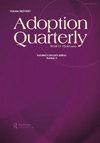A Phenomenological Exploration of Adoptive Parent Experiences of Support During the Adoption Process
IF 0.6
Q3 SOCIAL WORK
引用次数: 1
Abstract
Abstract Children who age out of foster care face adjustments and mental health issues at higher rates than their peers, but those who are adopted have the opportunity to heal from previous trauma and experience better outcomes. To create healthy family systems for adopted children, adoptive parents need support and guidance as they personally adjust and help their children adjust to a new family system. Previous research has emphasized child identifiers rather than parent influence in efforts to understand adoption success and failure. In this transcendental phenomenological study, adoptive parents provided their lived experiences of support during the adoption process. The results were analyzed using the descriptive phenomenological psychological method and the results were framed using an adapted version of Bronfenbrenner’s ecological model. The results offered experiences of support at all 4 levels of the ecological model and provided a framework to use for future research to understand the influences of the sources of support and a guideline for agencies and counselors to use when serving adoptive families. The results can aid in the proactive development of training and support services for adoptive families and provide information for professionals by offering insight into the nontraditional structure of adoptive families.收养过程中养父母支持体验的现象学探索
长大后离开寄养家庭的儿童比同龄人面临更高的调整和心理健康问题,但那些被收养的儿童有机会从以前的创伤中治愈,并获得更好的结果。为了给被收养的孩子建立健康的家庭体系,养父母需要得到支持和指导,因为他们需要亲自调整并帮助他们的孩子适应新的家庭体系。以前的研究强调孩子的身份,而不是父母的影响,以努力理解收养的成功和失败。在这项先验现象学研究中,养父母在收养过程中提供了他们的生活支持经验。使用描述现象学心理学方法对结果进行分析,并使用Bronfenbrenner的生态模型的改编版本对结果进行框架。研究结果提供了在生态模型的所有4个层面上的支持经验,并为未来的研究提供了一个框架,以了解支持来源的影响,并为机构和辅导员在为收养家庭服务时提供了指导。研究结果有助于对收养家庭的培训和支持服务的积极发展,并通过洞察收养家庭的非传统结构为专业人员提供信息。
本文章由计算机程序翻译,如有差异,请以英文原文为准。
求助全文
约1分钟内获得全文
求助全文
来源期刊

Adoption Quarterly
SOCIAL WORK-
CiteScore
1.60
自引率
12.50%
发文量
3
期刊介绍:
Adoption Quarterly is an unparalleled forum for examining the issues of child care, of adoption as viewed from a lifespan perspective, and of the psychological and social meanings of the word "family." This international, multidisciplinary journal features conceptual and empirical work, commentaries, and book reviews from the fields of the social sciences, humanities, biological sciences, law, and social policy. In addition to examining ethical, biological, financial, social and psychological adoption issues, Adoption Quarterly addresses continuity in adoption issues that are important to both practitioners and researchers, such as: negotiation of birth and adoptive family contact.
 求助内容:
求助内容: 应助结果提醒方式:
应助结果提醒方式:


